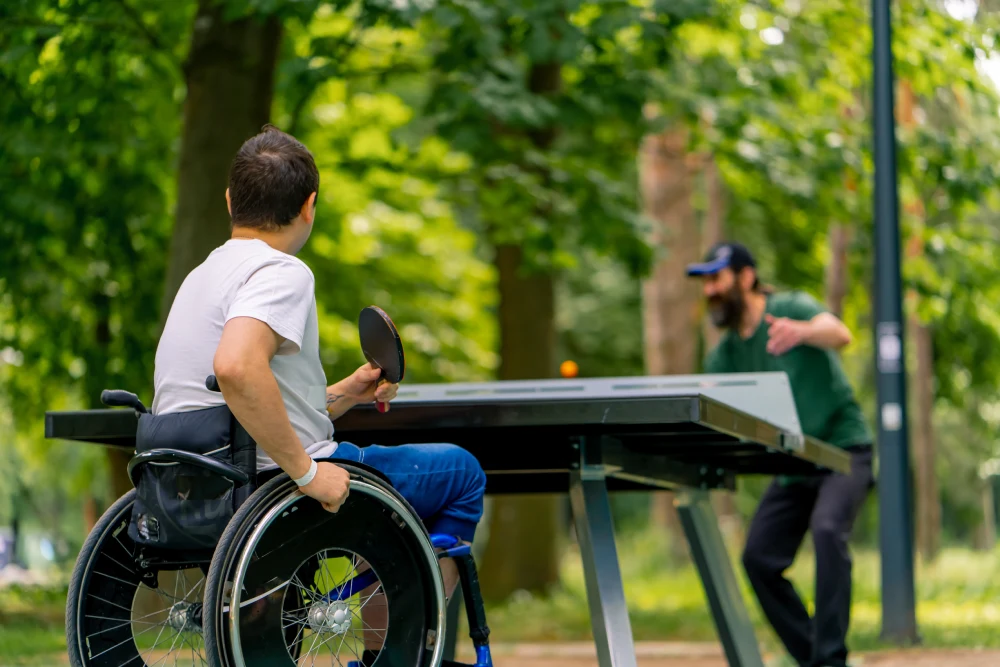Free Programs for Disabled Adults
Living with a disability means having to navigate a world that may not consider what you need, and finding reliable support can be essential for everyday well-being. It can be difficult to find trustworthy, free disability support, but options are available.
Several free disability programs are available, including government, nonprofit, and community-based services. These programs offer food assistance, free health care services, educational opportunities like job training, access to community centers, and more.
Understanding Free Disability Programs
Free government aid programs are available to people with disabilities that can help cut the costs of food, housing, medical treatment, and other living expenses. Taxes and other government sources fund these programs.
Nonprofit organizations are dedicated to their mission, not profits. Many of these organizations rely on donations and grants to stay in operation and often assist those most in need, from food pantries, meal delivery services, or community programs.
Nonprofits also operate some community-based services, though some are provided by municipalities, counties, or states. If the services are through the county or state, their funding will come from a combination of grants and government funding.

Government Programs for Disabled Adults
Social Security offers two programs for Americans with disabilities: Supplemental Security Income, or SSI, and Social Security Disability Insurance, or SSDI. However, the purposes and eligibility criteria for these programs differ.
SSDI provides benefits to those who have sufficient work histories but can no longer work because of a qualifying disabling condition. To qualify, you must be “insured,” meaning you’ve worked long enough and paid a sufficient amount of payroll taxes.
On the other hand, SSI is a needs-based program for low-income individuals who are blind, over 65, or have a qualifying disability. SSI isn’t based on your previous work. However, you must have little or no resources or income to qualify.
If you are eligible for SSI or SSDI, most states offer recipients access to other benefits, such as the following:
- Medical assistance programs: Medicaid and other programs provide health insurance for those with disabilities, low income, and who meet Social Security’s definition of disability.
- Food assistance programs: Supplemental Nutrition Assistance Program, or SNAP, and other food assistance programs help low-income households purchase the food they need.
- Housing assistance programs: The Housing Choice Voucher Program, or Section 8, helps those in need and disabled individuals afford housing. Participants can select any eligible housing, and rent is subsidized through direct payments to landlords.
- Vocational services: Many states also provide Vocational Rehabilitation Services for individuals with disabilities to help prepare them for employment.
Free Education & Job Training
If you don’t have a high school diploma, you can get a GED through an online program or an adult education program.
If you’re pursuing higher education, you can apply for the Federal Pell Grant, which assists students with disabilities, and the Federal Supplemental Educational Opportunity Grant, which aids students with financial needs. Various scholarships for disabled individuals are available, often covering partial or full tuition and sometimes providing extra funds for books and accommodations.
Students can also join a work-study program to earn money while attending school and working part-time.
State Vocational Rehabilitation programs could also benefit people with disabilities seeking education and job training. These programs help disabled individuals gain independence through education and job experience.
Assistive Technology training centers could also be helpful, offering equipment that helps maintain or improve the function of people with disabilities.
Free Recreation & Social Inclusion
There are also many social services and programs for people with disabilities to participate in, from adaptive sports to events at community centers.
If you love sports and want to get involved, Move United offers sports, adaptive sports, and adaptive equipment so more people can play a sport, regardless of their abilities. If you have a community center, there could be a sports team league you can join.
Through Museums for All, if you receive SNAP benefits, you have free or reduced admission to over 1,500 museums throughout the U.S.
New Horizons Un-Limited provides a listing of accessible and online museums.


Local State Programs
If you have a disability, you should explore your state’s specific programs. All states differ in their services, and it’s worth looking into city, county, and state-operated programs.
Whether you live in New York, Florida, California, or Michigan, disability resources help individuals manage their daily lives, receive quality care, and thrive. Florida’s Adult Protective Services Program provides various services for disabled adults, as does the Center for Independence of the Disabled, New York. Disability Resources lists the resources and benefits available in every state.
Services can provide community awareness and advocacy, information referrals, peer support, transition services, and help grow independent living skills.
How to Apply
When applying for disability, you will need information like your name, date, place of birth, marital status, names and dates of your children, U.S. military service, job history, employer details for the last two years, health care provider information, and a list of your medical conditions. Also, gather all the medical records and proof of your employment, education, and training history.
If you need help finding disability resources, search the Disability Information and Access Locator, Administration for Community Living, or the U.S. Department of Health and Human Services for programs for people with disabilities.
Be aware of any phone calls claiming to be from Social Security, as scammers have impersonated them to steal your information. Never give your Social Security number or account numbers to someone who calls you. If you feel pressured to provide your information, it’s likely a scam.
If you need help applying for benefits, you can make an appointment at your local Social Security office for help applying, or you can contact a disability attorney. An experienced disability attorney or accredited advocate will handle the entire process for you from beginning to end.
How Disability Advice Can Help With SSDI Benefits
If you’re dealing with a disabling condition and can no longer work, it can be difficult to know what benefits you qualify for and how to apply for them. Disability Advice can help. Our disability lawyers and accredited advocates have years of experience developing successful SSDI and SSI claims and applications. Applicants are three times more likely to be approved when working with an attorney or accredited advocate. If your claim has been denied, we can help you with the appeals process, increasing your approval odds. We can also advise you about other benefits that are available to you.
Contact us today for a free consultation.
